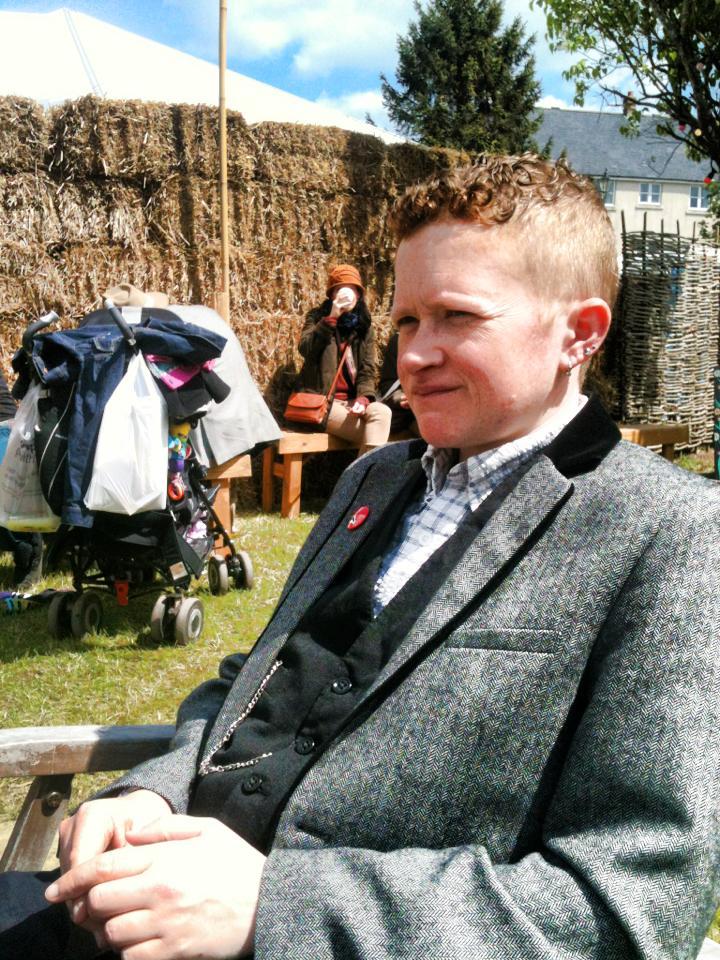Annabel Laughton, Gloucestershire, UK, SSH Blog Correspondent

This week I was delighted to meet Dr. Finn Mackay, a teacher and feminist activist. She’s a sociology lecturer and former youth worker, and has a special interest in working with boys and men, as a researcher and campaigner. She’s involved with the White Ribbon Campaign, and domestic violence prevention work, and speaks and writes about feminism and male violence against women.
First we talk about Reclaim the Night. Mackay set up the London Feminist Network in 2004 and revived a national women-only Reclaim the Night march held in London every November. Mackay explains how Reclaim the Night marches directly tackle intimidation of women in public space. “Public space is gendered, though it shouldn’t be,” she says.
As the name suggests, Reclaim the Night is women’s takeover of public space from men. I ask her about the street harassment I experienced on my local Reclaim the Night march in November, and she laughs wryly. “That happens on all the marches. Groping, asking the way to brothels… it’s an explicit reaction to women taking back the space. Men feel we are trespassing. It’s their way of saying, ‘these are our streets; go back home.'”
Reclaim the Night marches are a powerful statement. For her book, Radical Feminism: Feminist Activism in Movement, Mackay interviewed women about Reclaim the Night, and many women said the march was the only time they could feel safe and powerful.
Is street harassment getting better or worse, I asked?
Her answer is grimly definite: worse. Mackay explains that in her experience, young women say street harassment is an inevitable part of a night out, and how if they reported every instance, they’d never be off the phone. Working in secondary schools in London on anti-bullying campaigns, it was common for girls to report that they would go out wearing two pairs of pants, or would wear tights in summer, because it was so normal for boys to try to grope them inside their underwear. She believes women feel they have to appear unaffected by incidents, not wanting to appear delicate, prudish, or like a victim, and talks about women priding themselves on thinking of witty ripostes to sexual comments. She also explains that most people don’t know the definition of sexual assault (in the UK this is any unwanted intentional sexual touching), and are unsure at what point harassment becomes a criminal offence.
Next I want to find out what Mackay thinks about other areas that interlock with street harassment, like porn. Her view is that it’s an enabler. “Porn is part of a culture where men have to do things to women, and women have to put up with them; a predator/prey dynamic.”
Even more directly, a man can see violent images online and think, “I’ll go and do that to a woman”. Likewise, online harassment is part of that culture of women putting up with everything. The vicious, vitriolic online misogyny experienced by women has contributed to the development of a dialogue where the victim is expected to “toughen up” – because it “happens to everyone”.
Finally, we talk about causes and prevention. Good sex and relationships education (SRE) in schools, including education around consent, would go a long way. At present, there is no duty on schools to teach more than the biology of reproduction, despite many attempts by campaign groups, so provision varies. While there is some progressive, radical work in schools, others offer no SRE, and even in schools that do, it’s often taught by an over-worked gym teacher or someone else without adequate training. Mackay is sceptical about statutory consent campaigns.
“One recent one was, ‘Give it: Get it’. This doesn’t take apart the predator/ prey dynamic. In fact, it sets it up. It’s obvious who’s doing the giving and who’s doing the getting. This is still about controlling women’s sexuality; it removes their sexual agency, as well as assuming men are desperate for sex and women have to be persuaded. And what can be given, can also be taken.”
This points to an urgent need for educating men and boys, and for tackling the expectations of how men behave. In Mackay’s experience, men are usually shocked and defensive about how they come across, even perpetrators of domestic violence. “They split the power thrill [of the act of violence] from the reaction. This is a status defence; they know they have higher status. Men need help. We need to think about how we’re constructing masculinity.”
In the end, though, Mackay sees street harassment in the broadest possible context: the whole of society. “We live in a male supremacy; there’s no getting away from that. All our major institutions are run by men. Ultimately, we need to change the whole picture.”
Annabel is involved in campaigns for human rights, mental health, environmental issues and social justice. She has an honours degree in Classical Studies, a diploma in counselling, and works in Higher Education.
